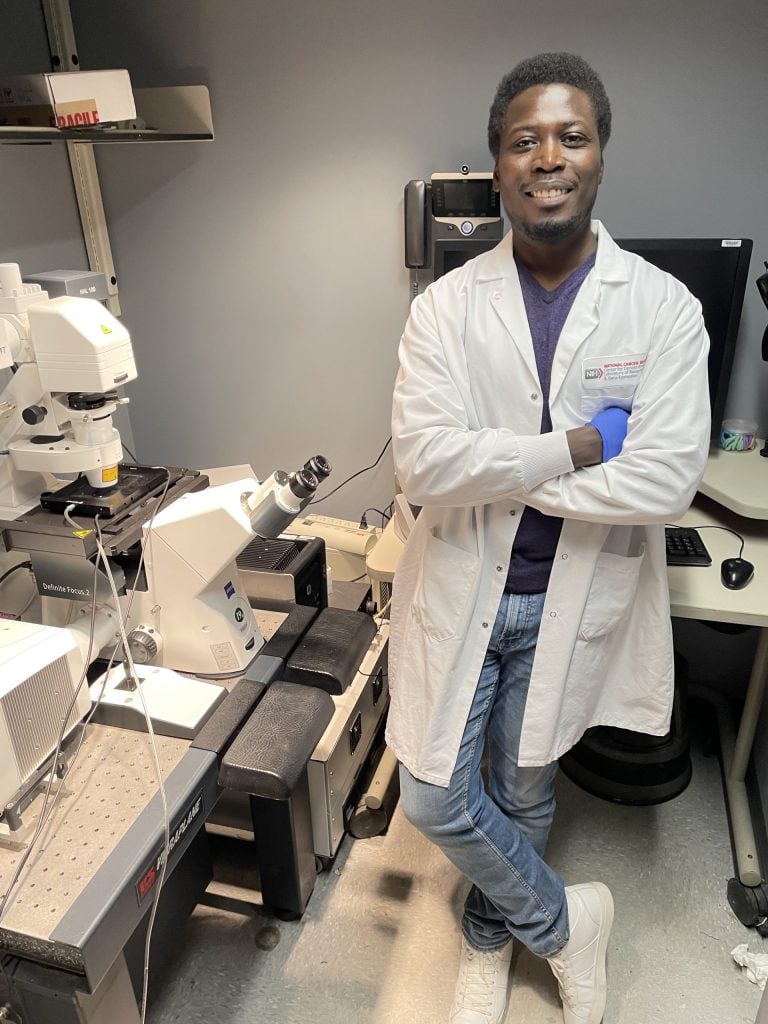As an eager student in his native Ghana, Theophilus Tettey, PhD, saw firsthand how classroom theories had real-world implications. Now, as a researcher at the National Cancer Institute, he hopes to one day create a laboratory that thrives on working across disciplines while providing a welcoming environment for up-and-coming scientists.
Growing up in Ghana, West Africa, Theophilus Tettey, PhD, stood out as an exceptional student from an early age. Ghana’s educational system steers high-performing students toward math and science, and teachers quickly recognized his remarkable potential. Yet it wasn’t until his undergraduate years at the University of Ghana, Legon, that his true passion for science ignited — sparked by a final-year course on the biochemistry of hormones.

Today, Tettey is a research fellow at the Laboratory of Receptor Biology and Gene Expression in the Center for Cancer Research at the National Cancer Institute (NCI). He joined the lab of Gordon Hager, PhD, in 2020 after earning his PhD at the Stowers Institute for Medical Research in Kansas City, Mo. At the Stowers Institute, Tettey’s research uncovered a novel role of the histone chaperone FACT, a protein strongly linked to aggressive cancers, in RNA promoter-proximal pausing. His current work continues to probe similar mysteries.
Endocrine News spoke with Tettey to learn more about he first fell in love with the endocrine specialty and his experiences as a rising, young investigator.
Endocrine News: When did you know the endocrinology specialty would become your life’s work?
Tettey: The turning point came during my final year as an undergraduate at the University of Ghana. I took a course called biochemistry of hormones, and for the first time I saw how hormones function as the body’s master regulators — coordinating stress responses, metabolism, growth, and reproduction. At the same time, I was interning at the Noguchi Memorial Institute for Medical Research, where I was studying immune responses to malaria in children. Experiencing both the classroom theory and its real-world implications side-by-side made a lasting impression. I realized that endocrinology wasn’t just an academic subject — it was a framework for understanding how multiple systems of the body communicate, and how disruptions in that communication contribute to disease. That connection between mechanism and medicine was what sparked my commitment to the field.

EN: What is your current research focus in Hager’s lab?
Tettey: In the Hager lab, I study how mutations in the glucocorticoid receptor influence hormone signaling at both the molecular and organismal level. To do this, I combine genomics, molecular biology, and advanced imaging tools such as number-and-brightness microscopy and single-molecule tracking to observe receptor dynamics in living cells. These approaches allow us to see, in real time, how hormone receptors move, engage chromatin, and recruit cofactors to regulate gene expression. In parallel, I apply genomics and chromatin biology to map how these molecular events translate into changes in transcriptional programs across the genome.
“Experiencing both the classroom theory and its real-world implications side-by-side made a lasting impression. I realized that endocrinology wasn’t just an academic subject — it was a framework for understanding how multiple systems of the body communicate, and how disruptions in that communication contribute to disease. That connection between mechanism and medicine was what sparked my commitment to the field.” – Theophilus Tettey, PhD, research fellow, Laboratory of Receptor Biology and Gene Expression, Center for Cancer Research, National Cancer Institute, Bethesda, Md.
Alongside the cell-based work, I also use genetically engineered mouse models to understand how specific receptor mutations affect whole-body physiology, from stress hormone regulation to development. By bringing together live-cell imaging, genomic profiling, and in vivo models, my research aims to connect single-molecule events with systemic outcomes. Ultimately, this integrated approach provides insight into why certain hormone receptor mutations cause resistance to therapy and how we might design strategies to restore function.
EN: Does any of your current research deal with what would be considered rare endocrine disorders?
Tettey: We recently completed a study of a family with glucocorticoid resistance, a rare endocrine disorder caused by a novel NR3C1 gene mutation. It leads to glucocorticoid insensitivity, HPA axis hyperactivity, hypertension, androgen excess, and poor cortisol suppression. Our work could also inform eventual treatments. We created the first patient-derived NR3C1 CRISPR knock-in mouse model, which mirrors the patient phenotype and provides a preclinical tool to test therapies such as selective glucocorticoid receptor modulators, gene editing, or targeted small molecules aimed at restoring function and reducing symptoms.
EN: How did you first get connected with the Endocrine Society?
Tettey: My first connection was through the FLARE Award in 2024, which gave me the opportunity to attend the ENDO meeting and present my work. Being there, surrounded by clinicians and basic scientists working on different aspects of endocrinology, was inspiring. It showed me how discoveries in the lab directly connect to human health, and it made me feel part of a larger scientific community.
EN: You’re in the early stages of your career as an investigator. Where do you see yourself in five or 10 years?
Tettey: In the next five to 10 years, I see myself leading an independent research program that connects hormone biology, genomics, and advanced imaging with questions directly relevant to human disease. My focus will be on understanding how stress and hormone signaling reshape the genome and contribute to disorders such as cancer and endocrine resistance.
“I want to create a lab that not only generates high-quality science but also trains the next generation to think across disciplines — from molecular mechanisms to translational models. By combining genomics, chromatin biology, and in vivo systems, I hope to position my lab at the intersection of discovery and application, where insights from basic biology can be turned into strategies that improve patient outcomes.” – Theophilus Tettey, PhD, research fellow, Laboratory of Receptor Biology and Gene Expression, Center for Cancer Research, National Cancer Institute, Bethesda, Md.
Equally important to me is building a team environment where young scientists can thrive. I want to create a lab that not only generates high-quality science but also trains the next generation to think across disciplines — from molecular mechanisms to translational models. By combining genomics, chromatin biology, and in vivo systems, I hope to position my lab at the intersection of discovery and application, where insights from basic biology can be turned into strategies that improve patient outcomes.

EN: That segues into the current challenges facing scientists. How do you and your colleagues stay motivated and focused on your goals?
Tettey: I focus on what I can control — advancing projects, sharing results, and building collaborations — while also maintaining balance outside the lab. Time with family and hobbies such as soccer, chess, or playing guitar gives me the energy and perspective to return ready to tackle the next challenge.
Shaw is a freelance writer based in Carmel, Ind. She is a regular contributor to Endocrine News and writes the monthly Laboratory Notes column.

